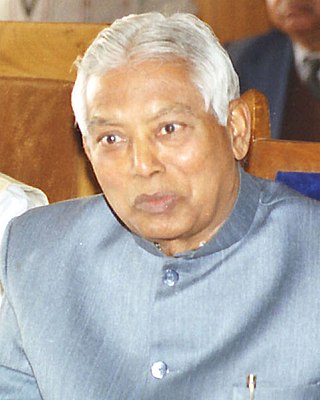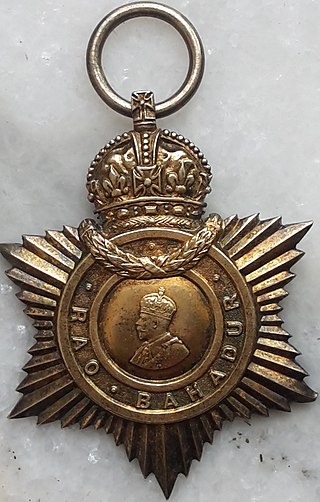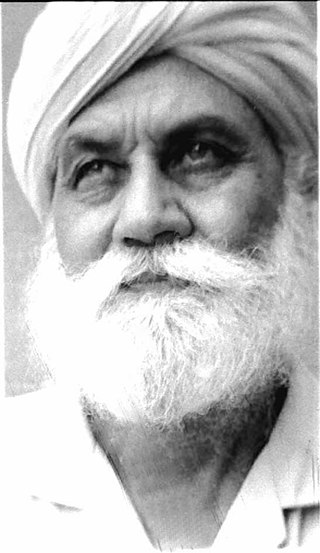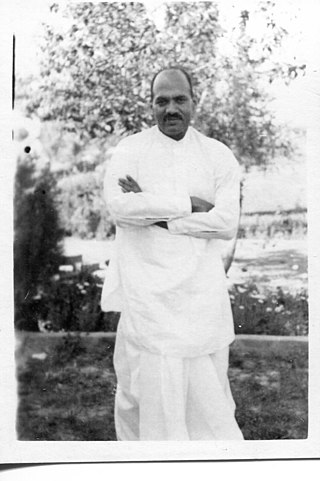Related Research Articles

Lala Lajpat Rai was an Indian revolutionary,politician,and author,popularly known as Punjab Kesari. He was one of the three members of the Lal Bal Pal trio. He died of severe trauma injuries sustained in October 1928 during a baton charge by police in Lahore,when he led a peaceful protest march against the all-British Simon Commission.
Bhiwani is a city and a municipal council in Bhiwani district in the state of Haryana. Besides being a seat of spiritual learning,the city is at the centre of regional politics and hometown of three former Haryana chief ministers:Bansi Lal,Banarsi Das Gupta and Hukum Singh. It is located 128 km west of national capital New Delhi.

Suraj Bhan was an Indian politician who was elected to the Lok Sabha for four terms from Ambala. He also served as the Deputy Speaker of Lok Sabha from July 1996 to December 1997. He served as governor of Uttar Pradesh,Himachal Pradesh,and Bihar.

Rai Bahadur and Rao Bahadur,abbreviatedR.B.,was a title of honour bestowed during British rule in India to individuals for outstanding service or acts of public welfare to the Empire. From 1911,the title was accompanied by a medal called a Title Badge. Translated,Rai or Rao means "King",and Bahadur means "Brave". Bestowed mainly on Hindus,the equivalent title for Muslim and Parsi subjects was Khan Bahadur. For Sikhs it was Sardar Bahadur.
Indrajit Gupta was an Indian politician who belonged to the Communist Party of India (CPI). From 1996 to 1998,he served as Union Home Minister in the United Front governments of prime ministers H. D. Deve Gowda and I. K. Gujral. That was a dramatic reversal of roles,as the home ministry had,since independence in 1947,banned the CPI thrice,with many of its members,including Gupta,being sent to prison or pushed underground for long stretches. He is to-date the longest-serving member having been elected eleven times to the Lok Sabha,the lower house of Indian Parliament. He suffered his only electoral reverse when he lost to Ashok Krishna Dutt in 1977 after the CPI supported Emergency.

Harchand Singh Longowal was the President of the Akali Dal political party during the Punjab insurgency of the 1980s. He had signed the Punjab accord,also known as the Rajiv-Longowal Accord with Rajiv Gandhi on 24 July 1985. The government accepted most of the Akali Dal demands,who in turn agreed to withdraw their activism. Less than a month after signing the accord,Longowal was assassinated.

The Dashmesh Regiment is a militant group,and is part of the Khalistan movement to create a Sikh homeland called Khalistan via armed struggle.

Sant Fateh Singh was an Indian Sikh religious and political leader,and a key figure in the Punjabi Suba movement.
Chopra is a surname of the Khatri community mainly based in Haryana and Indian Punjab. Chopra Khatris belonged to the Bahri family-group,which also includes the subclans Dhawan,Kakkar,Kapoor,Khanna,Mehra,Malhotra,Sehgal,Seth,Tandon,Talwar,and Vohra.

General elections were held in British India in 1934. The Indian National Congress emerged as the largest party in the Central Legislative Assembly.

The Babbar Akali movement was a 1921 splinter group of "militant" Sikhs who broke away from the mainstream Akali movement over the latter's insistence on non-violence over the matter of the restoration of Khalsa Raj in Punjab as under the prior Sikh Empire as well as gurdwara reforms in restoring pre-colonial gurdwara environments.

Teja Singh Sutantar,also by his sobriquet Swatantar,was a national revolutionary of India who fought for the independence of India from the British Raj and for the liberation of Punjab peasantry from the clutches of feudal lords. He was a member of the 5th Lok Sabha from Sangrur constituency as a CPI candidate. He also was Member of Punjab Legislative Assembly from 1937 to 1945 and member of Punjab Legislative Council from 1964 to 1969.
The Lal Communist Party Hind Union was a political party in Punjab,India. The party was led by Teja Singh Swatantar. It led militant agrarian struggles in the PEPSU regions. The Lal Communist Party merged back into the Communist Party of India in 1952.
Khushwant Lal Wig (1904–1986) was an Indian physician,medical academic,writer and the director of the All India Institute of Medical Science,New Delhi. He was a Fellow of the Royal College of Physicians of London and a recipient of Dr. B. C. Roy Award,the highest Indian award in the medical category. The Government of India awarded him the third highest civilian honour of the Padma Bhushan,in 1964,for his contributions to the Medical science.

Hari Ram Gupta was an Indian historian. The main focus of his work was the Sikh history of 18th century. During 1957 to 1963,he was head of Panjab University's History department. Following his retirement,he was an honorary professor in the History department of University of Delhi from 1964 to 1967.

Kundan Lal was an Indian businessman,freedom fighter,philanthropist and founder of Kundan Vidya Mandir,one of the first girls' schools in Ludhiana.
The 1962 Punjab Legislative Assembly election was the Third Vidhan Sabha election of the state when the Indian National Congress emerged as the largest party with 90 seats in the 154-seat legislature in the election. The Shiromani Akali Dal became the official opposition,holding 16 seats. From 5 July 1966 to 1 November 1966,Assembly was under suspension.

Raja Braj Raj Dev was a ruler of the Deva dynasty of Jammu,Jamwal Dogras,who ruled from 1782 to 1787. He was a ruler,but failed to stop Sikh invasions in Jammu. In 1785,the Sikhs occupied Basholi,Jasrota,and Ramnagar. The Battle of Jammu (1774) was fought between him and Ranjit Dev.
References
- ↑ "Former Punjab speaker dead". Hindustan Times. Retrieved 27 February 2020.
- ↑ "Former Punjab Assembly speaker Harbans Lal Gupta passes away". Zee News. 30 November 2013. Retrieved 30 April 2014.